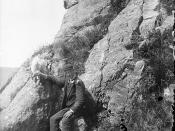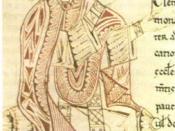The Beginnings of the Church
Jerusalem was the centre of the Christian movement, at least until its destruction by Roman armies in AD 70, but from this centre Christianity radiated to other cities and towns in Palestine and beyond. At first, its appeal was largely, although not completely, confined to the adherents of Judaism, to whom it presented itself as "new," not in the sense of novel and brand-new, but in the sense of continuing and fulfilling what God had promised to Abraham, Isaac, and Jacob. Already in its very beginnings, therefore, Christianity manifested a dual relation to the Jewish faith, a relation of continuity and yet of fulfilment, of antithesis and yet of affirmation. The forced conversions of Jews in the Middle Ages and the history of anti-Semitism (despite official condemnations of both by church leaders) are evidence that the antithesis could easily overshadow the affirmation. The fateful loss of continuity with Judaism has, however, never been total.
Above all, the presence of so many elements of Judaism in the Christian Bible has acted to remind Christians that he whom they worshipped as their Lord was himself a Jew, and that the New Testament did not stand on its own but was appended to the Old.
An important source of the alienation of Christianity from its Jewish roots was the change in the membership of the church that took place by the end of the 2nd century (just when, and how, is uncertain). At some point, Christians with Gentile backgrounds began to outnumber Jewish Christians. Clearly, the work of the apostle Paul was influential. Born a Jew, he was deeply involved in the destiny of Judaism, but as a result of his conversion, he believed that he was the "chosen instrument" to bring the message of Christ to...


